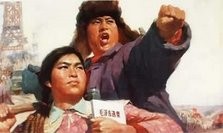An Associated Press article I read this morning made me recall George Lakoff's essay about the metaphors built into our language that shape our view of the world. In it, the reporter discusses how the Bush administration routinely uses sports imagery in its discourse. It got me thinking.
When we explain something complex to an audience, we use often metaphors and analogies to to convey an idea without overwhelming those who are uninformed with too many technical details, transferring the discussion into a context that is more familiar to the audience. When a poet attempts to describe her complex feelings about love or mortality, she may choose figurative language to represent these abstractions in concrete terms in such a way that we can experience them sensually. In this way, the greatest poetry makes us understand complex emotions with our bodies.
Politicians, who never relent in their efforts to advance their agendas, often use such imagery not to make what they are explaining clearer but to disguise an idea that the audience, if it were given enough info to understand the idea directly, would find upsetting, terrifying, outrageous, or damning of the speaker. For example, an Army spokesman describing the grisly deaths of ten American soldiers in a bomb attack might say, "We took one on the chin today," conjuring an image of a fist fight or a boxing match rather than charred body parts and young lives lost. We are less likely to doubt the whole war effort if we are taught to see its horrors in these terms. Language, then, can be used to distract us from the realities our world and our actions. Look out when perfectly understandable facts have been replaced by distracting metaphors.
In sports-distracted America, analogies to football, basketball, and baseball are incredibly useful to make things seem understandable but they can be incredibly deceptive. Certainly, most of us--especially men--understand sports and so understand these analogies. When we hear about touchdowns and homeruns, we understand, but few of us really understand the complexities of politics, of our own government, of history, of foreign relations, or our justice system, or of ethics. False sports analogies, like the ones described in the article, are often used to make us feel that the world is one big game that can be won or lost, that if we lose this one we can come back next season and try again, that the stakes are more about doing our best to defeat the other side than creating a peaceful whole, and that the world is divided up into teams we are loyal to no matter what.
What chance to do we have when all the news we get is during news briefs between televised sports and commercials?
Subscribe to:
Post Comments (Atom)

2 comments:
I am almost embarrassed I haven't noticed this language sooner. I don't quite understand how politicians can live with themselves. These men and women are chosen by us to do the best possible job representing our country. Everyday these same people go to Capitol Hill and make back room deals and loose touch with what they were originally summoned to do. The “you scratch my back, I’ll scratch yours” idea is constant, and while most citizens are not aware, each and every bill congress passes is full of pork. A bill on homeland security likely contains millions of dollars devoted to building a specific overpass in Iowa. This kind of stuff angers me and engages myself with the government and looking for better representatives, but how can we make everyone else angry? Why does the majority accept our current leaders and their way of doing government?
I get that "I-can't-believe-I-haven't-noticed- this before" thing too.
It's 20-20 hindsight - it's excruciatingly obvious once we see it, but we can't see it until after it has happened.
Post a Comment